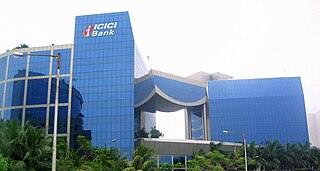
Microfinance consists of financial services targeting individuals and small businesses who lack access to conventional banking and related services. Microfinance includes microcredit, the provision of small loans to poor clients; savings and checking accounts; microinsurance; and payment systems, among other services. Microfinance services are designed to reach excluded customers, usually poorer population segments, possibly socially marginalized, or geographically more isolated, and to help them become self-sufficient. ID Ghana is an example of a microfinance institution.

ICICI Bank Limited is an Indian multinational bank and financial services company headquartered in Mumbai with a registered office in Vadodara. It offers a wide range of banking and financial services for corporate and retail customers through various delivery channels and specialized subsidiaries in the areas of investment banking, life, non-life insurance, venture capital and asset management.

The State Bank of Pakistan (SBP) is the central bank of Pakistan. Its Constitution, as originally laid down in the State Bank of Pakistan Order 1948, remained basically unchanged until 1 January 1974, when the bank was nationalised and the scope of its functions was considerably enlarged. The State Bank of Pakistan Act 1956, with subsequent amendments, forms the basis of its operations today. The headquarters are located in the financial capital of the country in Karachi. The bank has a fully owned subsidiary with the name SBP Banking Services Corporation (SBP-BSC), the operational arm of the Central Bank with Branch Office in 16 cities across Pakistan, including the capital Islamabad and the four provincial capitals Lahore, Karachi, Peshawar, Quetta. The State Bank of Pakistan has other fully owned subsidiaries as well: National Institute of Banking and Finance, the training arm of the bank providing training to Commercial Banks, the Deposit Protection Corporation, and ownership of the Pakistan Security Printing Corporation.

Econet, officially known as Econet Group, is a diversified telecommunications group with operations and investments in Africa, Europe, South America and the East Asia Pacific Rim, offering products and services in the core areas of mobile and fixed telephony services, broadband, satellite, optical fiber networks and mobile payment.
Kotak Mahindra Bank Limited is an Indian banking and financial services company headquartered in Mumbai. It offers banking products and financial services for corporate and retail customers in the areas of personal finance, investment banking, life insurance, and wealth management. As of December 2023, the bank has 1,869 branches and 3,239 ATMs, including branches in GIFT City and DIFC (Dubai).

The Rizal Commercial Banking Corporation, commonly known as RCBC, is one of the largest universal banks in the Philippines with total consolidated resources of Ph₱ 1.2 trillion. It was established in 1960 as a development bank and is licensed by the Bangko Sentral ng Pilipinas (BSP) for both commercial and investment banking. It is currently headquartered at RCBC Plaza in Makati, Metro Manila.

Small Industries Development Bank of India (SIDBI) is the apex regulatory body for overall licensing and regulation of micro, small and medium enterprise finance companies in India. It is under the jurisdiction of Ministry of Finance, Government of India headquartered at Lucknow and having its offices all over the country.

Village banking is a microcredit and saving methodology whereby financial services are administered locally in a community bank rather than in a centralized commercial bank. Village banking has its roots in ancient cultures and was most recently adopted for use by micro-finance institutions (MFIs) as a way to control costs. Early village banking methods were innovated by Grameen Bank and then later developed by groups such as FINCA International founder John Hatch. Among US-based non-profit agencies there are at least 31 microfinance institutions (MFIs) that have collectively created over 800 village banking programs in at least 90 countries. And in many of these countries there are host-country MFIs—sometimes dozens—that are village banking practitioners as well. The latest developments globally can be seen in Southeast Asia, where digitization is pacing fast to reach rural areas with hybrid on- and offline solutions.
Non-Banking Financial Company (NBFC) is a company registered under the Companies Act, 1956 of India, engaged in the business of loans and advances, acquisition of shares, stock, bonds, hire-purchase insurance business or chit-fund business, but does not include any institution whose principal business is that of agriculture, industrial activity, purchase or sale of any goods or providing any services and sale/purchase/construction of immovable property.

M-PESA is a mobile phone-based money transfer service, payments and micro-financing service, launched in 2007 by Vodafone and Safaricom, the largest mobile network operator in Kenya. It has since expanded to Tanzania, Mozambique, DRC, Lesotho, Ghana, Egypt, Afghanistan, South Africa and Ethiopia. The rollouts in India, Romania, and Albania were terminated amid low market uptake. M-PESA allows users to deposit, withdraw, transfer money, pay for goods and services, access credit and savings, all with a mobile device.
National Payments Corporation of India (NPCI) is an Indian public sector company that operates retail payments and settlement systems in India. The organization is an initiative of the Reserve Bank of India (RBI) and the Indian Banks' Association (IBA) under the provisions of the Payment and Settlement Systems Act, 2007, for creating a robust payment and settlement infrastructure in India.
Afrasia Bank Zimbabwe, was a commercial bank in Zimbabwe that was a subsidiary of AfrAsia Bank Limited. It was one of the regulated banking institutions licensed by the Reserve Bank of Zimbabwe, the country's central bank and national banking regulator.

Faulu Microfinance Bank Limited, commonly referred to as Faulu Kenya, is a microfinance bank based in Kenya. It is regulated by the Central Bank of Kenya. The word Faulu is Swahili for succeed.
Salaam Somali Bank, often abbreviated to SSB, is a Somali commercial bank. It is headquartered in Mogadishu, Somalia. SSB is one of the largest privately owned banks in the country.
Microfinance in Kenya consists of microfinance facilities and regulations in Kenya which has been developing since the mid 1990s. Legislation was passed in 2006 with the Micro Finance Act which became active in 2008. By 2010 there were more than twenty large micro finance institutions in Kenya, which provided US $1.5 billion to approximately 1.5 million active borrowers. With over 100,000 clients, Equity Bank Kenya had the largest share of business loans representing market share of 73.50% followed by Kenya Women Microfinance Bank with 12.06%. Most microfinance firms as in other countries have eligibility criteria which may include gender, age, a valid Kenyan ID, a business, an ability to repay the loan and be a customer of the institution.
SMEP Microfinance Bank Limited is a public limited company incorporate under the companies Act and licensed under the Microfinance Act regulated by the Central Bank of Kenya to offer banking services focusing on Group banking, SME & Church banking. SMEP has a subsidiary company, SMEP Insurance Agency, which provides insurance services to diverse customer insurance needs
First MicroFinance Bank-Tajikistan (FMFB-T) is a commercial bank of the Aga Khan Development Network involved in microfinancing operations. The Bank was established in 2003, and has its head office at Dushanbe.

EcoCash, is a mobile phone-based money transfer, financing and microfinancing service, launched in 2011 by Econet Wireless, for its customers in Zimbabwe. The platform has been targeted by the Zimbabwe government. The company's headquarters is in the EcoCash Holdings HQ along Liberation Legacy Road in Borrowdale, a suburb of Harare, the largest city and capital of Zimbabwe.
The Center for Agriculture and Rural Development, Inc. is a micro-finance oriented rural bank in the Philippines established in 1997, and is currently regulated by the Bangko Sentral ng Pilipinas. Its main office is located in San Pablo City, Laguna. As of May 2019, Card Bank, Inc. has 750 service offices nationwide.










